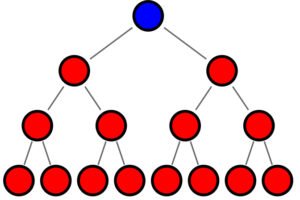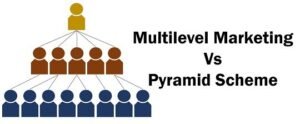The realms of multi level marketing and pyramid schemes often intersect, yet they represent vastly different business models and ethical practices.
While MLM offers legitimate opportunities for individuals to build businesses and earn income through product sales and team building, pyramid schemes exploit participants through unsustainable recruitment-focused models.
In this exploration, we delve into the distinctions between these two concepts, shedding light on their mechanisms, implications, and impact on aspiring entrepreneurs and consumers alike.
Key Differences Between Multi level Marketing and Pyramid Scheme

- Business Model:
- MLM: Distributors earn from product sales and recruitment.
- Pyramid Scheme: Focuses on recruitment with little emphasis on product sales.
- Product Emphasis:
- MLM: Offers legitimate products or services.
- Pyramid Scheme: Often lacks tangible products or offers low-quality ones.
- Revenue Streams:
- MLM: Income from retail sales and team commissions.
- Pyramid Scheme: Revenue mainly from recruitment fees, unsustainable.
- Recruitment Focus:
- MLM: Recruitment is part but not sole focus.
- Pyramid Scheme: Primarily focused on recruiting new members.
- Legality:
- MLM: Many operate legally with genuine products.
- Pyramid Scheme: Illegal due to deceptive practices.
Exploring the Top Multi Level Marketing Companies
Legal and Ethical Considerations in Multi level Marketing and Pyramid Scheme
- Regulatory Compliance:
- MLM: Legitimate MLM companies adhere to regulatory guidelines and ensure transparency in their operations.
- Pyramid Scheme: Pyramid schemes often operate outside legal frameworks, violating laws related to fraud and deceptive practices.
- Product Value:
- MLM: Products in MLM should offer genuine value to consumers, and distributors should focus on selling products rather than solely recruiting.
- Multi level Marketing and Pyramid Scheme : Products in pyramid schemes may be of low quality or non-existent, serving primarily as a cover for the recruitment-focused structure.
- Income Representation:
- MLM: Ethical MLM companies refrain from making exaggerated income claims and provide realistic expectations to distributors.
- Multi level Marketing and Pyramid Scheme : Participants in pyramid schemes are often misled with promises of high returns without disclosing the inherent risks and unsustainable nature of the scheme.
- Focus on Customers vs. Recruits:
- MLM: Legitimate MLM companies prioritize serving customers and delivering value through their products or services.
- Pyramid Scheme: Pyramid schemes prioritize recruitment of new members over product sales, leading to a focus on expanding the participant base rather than delivering value to customers.
- Long-Term Sustainability:
- MLM: Ethical MLM companies aim for long-term sustainability by offering quality products, supporting distributor success, and complying with legal requirements.
- Pyramid Scheme: Pyramid schemes are inherently unsustainable, relying on constant recruitment to generate income without delivering genuine value to participants.
A Comprehensive Guide to multi level marketing services
The Impact of Multi level Marketing and Pyramid Scheme on Society and Economy

- Economic Impact:
- MLM: Contributes positively by creating jobs and fostering entrepreneurship.
- Pyramid Scheme: Can have detrimental effects by deceiving participants and diverting resources.
- Social Impact:
- MLM: Empowers individuals and fosters community.
- Pyramid Scheme: Exploits participants and damages relationships.
- Consumer Protection:
- MLM: Prioritizes consumer protection and compliance.
- Pyramid Scheme: Poses risks to consumers with false promises.
- Regulatory Response:
- MLM: Subject to regulation to ensure legality and protect consumers.
- Pyramid Scheme: Illegal, actively targeted by regulators to prevent harm.
multi level business marketing: The Ultimate Guide to Building a Successful
In summary, the comparison between Multi-level Marketing and Pyramid Schemes underscores the importance of discerning legitimate business practices from deceptive ones.
While MLM presents avenues for entrepreneurship and community, Pyramid Schemes pose substantial risks to individuals and the economy, highlighting the need for consumer awareness and regulatory vigilance.
Multi level Marketing Software India
Frequently Asked Questions for Multi level Marketing and Pyramid Scheme :
What is an example of Multi-level Marketing and Pyramid Schemes?
An example of a legitimate multi-level marketing (MLM) company is Amway, which offers a wide range of products such as health, beauty, and home care items. Distributors earn commissions from product sales and team building efforts.
Conversely, an example of a pyramid scheme is the infamous “Bernie Madoff Ponzi Scheme,” where investors were promised high returns but were paid with funds from new investors rather than profits from legitimate investments.
What is another name for a pyramid scheme?
Another name for a pyramid scheme is a “Ponzi scheme.”
What is the difference between a pyramid scheme and a direct selling company?
- Pyramid Scheme: Primarily focuses on recruiting participants, promising high returns for recruitment.
- Direct Selling Company: Generates revenue through product sales to consumers, with distributors earning commissions.
Emphasis on Product Sales:
- Pyramid Scheme: Products often of low quality or secondary to recruitment.
- Direct Selling Company: Strong emphasis on selling tangible products or services to consumers.
Sustainability:
- Pyramid Scheme: Unsustainable, relying on constant recruitment.
- Direct Selling Company: Built on sustainable business models, reliant on product sales.
Legality:
- Pyramid Scheme: Illegal due to deceptive practices.
- Direct Selling Company: Operates legally within regulations.
Multi-level Marketing and Pyramid Schemes differ in their emphasis on product sales versus recruitment, sustainability, and legality.
MLM operates legitimately, focusing on product sales and regulatory compliance. In contrast, Pyramid Schemes exploit participants through deceptive recruitment practices and lack sustainability.
The article recourses
https://consumer.ftc.gov/articles/multi-level-marketing-businesses-pyramid-schemes
https://mbamci.com/2023/02/uncovering-the-truth-behind-mlm-pyramid-schemes/



